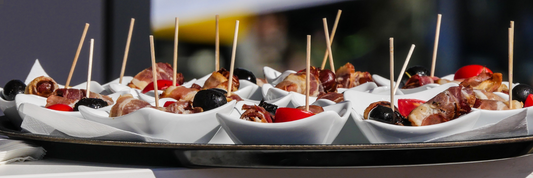In the fast-paced and competitive F&B industry, investing in the right catering equipment is a critical first step to running an efficient, professional, and cost-effective operation. Whether you're planning to open a new café, revamp your restaurant workflow, or simply want to streamline daily operations, understanding which catering equipment you need and how to choose it wisely can give your business a serious edge.
This guide will walk you through a complete checklist of essential catering equipment, share tips on choosing the right suppliers, and help you select the best tools based on your business model whether you're running a small coffee shop or a full-scale restaurant. Let Kimecopak help you make smart investments that power your F&B success from day one.
-
What is Mise En Place? Benefits of Mise en Place? Mise en Place Steps
-
How to Open a Food Truck With No Experience
What Is Catering Equipment?

Catering equipment encompasses a range of tools, appliances, and devices designed to support the preparation, cooking, serving, and storage of food in a professional setting. In the food and beverage (F&B) industry, catering equipment plays a crucial role in ensuring that food service runs smoothly, efficiently, and safely.
Catering equipment differs from traditional kitchen equipment primarily in its scale and intended use. While kitchen equipment may be designed for home kitchens focusing on versatility and compactness catering equipment is tailored for larger operations, emphasizing durability, high capacity, and continuous performance. This distinction is essential for businesses that rely on fast service and consistent quality.
Types of Commercial Catering Equipment for Coffee Shops & Restaurants
Commercial catering equipment refers to high-capacity, durable appliances and tools specifically designed for professional food service environments such as coffee shops, restaurants, and catering businesses. These pieces of equipment are engineered to withstand long hours of use while maintaining quality and safety standards.
Why It's Important
The importance of commercial catering equipment cannot be overstated. These machines and tools are built for heavy usage and are often operating for extended hours throughout the day. Their design ensures that they can constantly produce high-quality food items and beverages without compromising safety or speed. Investing in reliable catering equipment can lead to a more efficient workflow, better food preparation, and, ultimately, satisfied customers.
Features to Look For
When selecting catering equipment for a commercial kitchen, keep an eye out for the following features:
- Energy Efficiency: Energy-efficient equipment not only reduces utility bills but also minimizes environmental impact, an essential consideration for modern businesses.
- Stainless Steel Construction for Hygiene: Stainless steel is a preferred material for commercial equipment because it is easy to clean, resistant to corrosion, and helps to maintain sanitation standards.
- Easy Maintenance and Spare Parts Availability: Choosing equipment that is easy to maintain and has readily available spare parts ensures minimal downtime and keeps your operation running smoothly.
Top Examples
Understanding the types of equipment essential for coffee shops and restaurants can aid in making informed decisions. Here are some top examples:
- Commercial Espresso Machines: Essential for coffee shops and cafes, these machines can deliver consistent, high-quality espresso quickly, meeting customer demand without delay.
- High-Capacity Refrigerators & Freezers: Reliable refrigeration units are vital for storing perishable ingredients. They ensure that food remains fresh and safe to consume, while high-capacity models cater to busy restaurants with substantial inventory needs.
- Heavy-Duty Ovens, Stoves, & Fryers: These appliances are designed for high-volume food production. They deliver the speed and efficiency required for various cooking methods, accommodating diverse menus and busy service periods.
Incorporating the appropriate catering equipment is key to running a successful food service operation. By focusing on quality, functionality, and efficiency, businesses can enhance their performance and provide excellent service to their customers.

Essential Catering Equipment Checklist
Coffee Brewing Equipment
A vital component of any catering business is the coffee brewing equipment, essential for serving high-quality beverages that can uplift your menu.
Professional Espresso Machines: A good espresso machine is crucial for any catering service that intends to offer coffee. Look for machines that can handle high volumes and have consistent performance.
- Industrial Coffee Grinders: Freshly ground coffee makes a significant difference in flavor. Investing in high-quality grinders ensures that you can provide the best coffee experience for your customers.
- Milk Frothers and Pitchers: Essential for creating lattes and cappuccinos, milk frothers allow for the perfect microfoam, while pitchers help in pouring beautiful designs.
- Barista Tools: A complete kit typically includes a tamper, knock box, and digital scale. These tools ensure that your baristas can produce consistent, quality beverages efficiently.
Cooking & Kitchen Equipment
A well-equipped kitchen is the backbone of any catering operation, allowing for efficiency and versatility in food preparation.
- Industrial Gas/Electric Stoves: Depending on your menu and volume, choose either gas or electric stoves. Industrial stoves are durable and designed to withstand heavy use.
- Ovens, Microwaves: Reliable ovens and microwaves are essential for baking, roasting, and reheating meals quickly and efficiently.
- Deep Fryers, Flat Grills: These are necessary for expanding your cooking options, whether frying crispy appetizers or grilling sandwiches.
- Panini Presses, Sandwich Grills: These machines offer versatility in preparing hot sandwiches and other grilled options, adding variety to your catering menu.
Storage & Preservation Equipment
Proper storage is crucial in maintaining ingredient freshness and adhering to food safety standards.
- Commercial-Grade Refrigerators and Freezers: Ensure you have ample storage for perishables, and consider units with adjustable shelving for versatility.
- Stainless Steel Shelving Systems: Durable and easy to clean, these shelving units provide a smart way to organize kitchen supplies efficiently.
- Airtight Food Storage Containers: These containers help prolong the freshness of ingredients while minimizing the risk of cross-contamination.
Serving & Cleaning Equipment
Effective service and cleanliness are as important as the food you serve, making these pieces of equipment indispensable.
- Service Trolleys, Trays: Ensure efficient service with mobile trolleys and trays that make it easy to carry multiple items at once.
- Industrial Dishwashers: Quick and efficient cleaning is critical. An industrial dishwasher can handle heavy loads while ensuring compliance with health standards.
- Trash Bins, Cleaning Kits: Keep your catering area clean and organized with adequate trash bins and all-purpose cleaning kits designed for commercial use.
POS & Sales Systems
An efficient Point of Sale (POS) system can streamline your operations and improve customer service.
- Touchscreen POS Machines: User-friendly interfaces make it easier for staff to take orders quickly and manage transactions efficiently.
- Thermal Receipt Printers: Essential for providing customers with quick printed receipts, these printers are vital for keeping good records.
- Inventory & Sales Management Software: Software that tracks sales and inventory helps in maintaining stock levels and optimizing menu offerings based on customer preferences.
How to Choose Reliable Catering Equipment Suppliers

When investing in catering equipment, finding the right supplier is just as important as choosing the equipment itself.
What Makes a Good Supplier?
- Transparent Warranty and Return Policies: A trustworthy supplier should offer clear warranty options and return policies. This builds confidence in your purchase.
- Post-Purchase Support and Maintenance Services: Suppliers that provide ongoing support can assist with troubleshooting and maintenance, ensuring that your equipment remains in top shape.
- Product Variety Across Different Budgets and Business Sizes: A good supplier should cater to various needs, ensuring that there's equipment that fits your budget and business scale.
Types of Suppliers to Consider:
- Local Distributors: They can provide faster service and delivery, often coming with the added benefit of in-person support.
- Online B2B Platforms: Use these platforms for better price comparison and access to a wide range of products.
- Specialized Brands: For long-term investments, consider suppliers that specialize in certain types of equipment known for quality and performance.
Tips for Working with Suppliers:
- Ask for Equipment Demos or Trial Options: Getting hands-on experience with equipment can provide insights into its practicality for your needs.
- Check Google Reviews, Trade References: This helps gauge the reliability of the supplier, ensuring you make a well-informed decision.
- Ensure Compliance with Food Safety and Energy Standards: Make sure that the products meet local regulations regarding food safety and energy usage, as this will save costs and ensure compliance.
Match Equipment to Your Business Type

For Small Cafes & Coffee Kiosks
When you're running a small cafe or a coffee kiosk, your equipment needs to be efficient and space-saving. Compact, multi-purpose machines can serve multiple functions, allowing you to maximize your limited space. For instance, a combination espresso machine that also brews coffee can save you both counter space and money.
Cost-effective starter kits are also a wise choice for newcomers in the catering world. These kits often include essential items like blenders, food processors, and small cooking devices that can handle a variety of tasks. By investing in a well-rounded starter kit, you're setting the foundation for your cafe’s success without breaking the bank.
For Full-Service Restaurants
Full-service restaurants require high-performance cooking refrigeration systems to manage their diverse menus. Investing in commercial-grade ovens, fryers, and grills ensures that you can cook with precision while maintaining the high standards expected by your customers.
Additionally, having equipment that supports a wide-ranging menu is crucial. Consider purchasing a variety of cooking tools, such as sous vide machines and induction cooktops, which can accommodate different cooking styles. This versatility can help in better handling peak times while also providing your chefs with the tools they need to experiment and innovate.
For Delivery & Takeaway-Only Setups
In a delivery and takeaway-only setup, speed and efficiency are key. Fast, portable packaging stations can streamline the process of bagging and preparing orders, ensuring that you meet customer demands promptly.
Investing in thermal boxes and sealing machines is also essential. Thermal boxes help maintain food temperature during transport, while sealing machines can ensure that items stay fresh and secure, reducing the risk of spills. These additions can significantly enhance the customer experience and help you build a loyal client base.
Maintenance Tips for Long-Lasting Equipment
To ensure your catering equipment runs smoothly for years to come, following a robust maintenance routine is essential:
- Clean equipment daily and deep-clean weekly: Regular cleaning prevents buildup of grease and grime, which can impair functionality and lifespan.
- Replace filters and worn-out parts regularly: Filters, especially in cooking and refrigeration equipment, need to be checked frequently to maintain performance.
- Train staff for proper usage: Ensuring your staff understands how to operate equipment correctly can reduce mishaps and prolong the equipment's life.
By adopting these practices, not only do you save on repair costs, but you also improve the overall efficiency of your operations.
Where to Buy Catering Equipment in Canada and Online

When sourcing catering equipment, knowing where to look makes all the difference. Here are some options available:
- Top local suppliers across major Canadian cities: Cities like Toronto, Vancouver, and Montreal boast several suppliers that offer a wide range of professional catering equipment. Shopping locally allows you to inspect items physically before purchasing, and you may even find local installation or maintenance support.
- E-commerce options: pros and cons: Online shopping offers convenience and access to a broader selection. However, without the ability to see items in person, you may encounter issues regarding quality or sizing. Always read reviews and check return policies before purchasing.
- Buying new vs used: cost-saving tips: Purchasing used equipment can lead to significant savings. Consider checking out online marketplaces or local auctions. Just ensure that you thoroughly inspect items before buying to avoid costly repairs down the line. New equipment, while often more expensive, typically comes with a warranty and the assurance of reliability.
Conclusion
Choosing the right catering equipment is crucial for not only saving costs but also boosting overall efficiency in your business. If you're unsure where to start or what to purchase, don't hesitate to contact Kimecopak for guidance and packaging solutions tailored to your specific needs.









